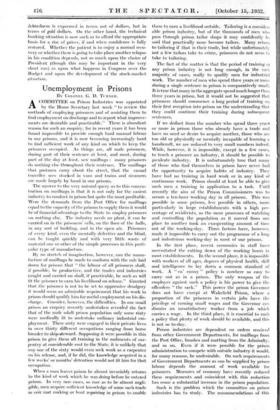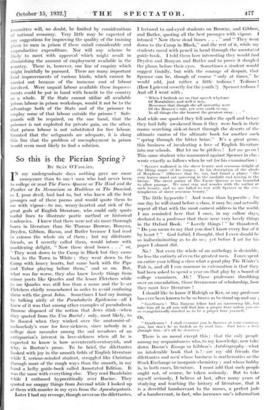Unemployment in Prison s BY COLONEL G. D. TURNER.
ACOMMITTEE on Prison Industries was appointed by the Home Secretary last . week " to review the methods of employing prisoners and of assisting them to find employment on discharge and to report what improve- ments- are desirable and practicable." . There is abundant reason for such an enquiry, for in recent years it has been found impossible to provide enough hard manual labour ire our prisons, and it is now becoming increasingly hard to find sufficient work of any kind on which to keep the prisoners occupied. As things are, all male prisoners, during part of their sentence at least, and most, during part of the day at least, sew mailbags : many prisoners do nothing else throughout their sentence. The mailbags that postmen carry about the street, that the casual traveller sees stacked in vans and trains and steamers are made largely by. hand in our prisons.
The answer to the. very natural query as to this concen- tration on mailbags is that it is not only far the easiest industry to conduct in prison but quite the most profitable. Were . the demands from the Post Office for mailbags equal to the capacity of the prisons to supply them it would be of financial advantage to the State to employ prisoners on nothing else. The industry needs no plant, it can be carried on in the prisoners' cells, on the floor of the halls, in any sort of building, and in the open air. Prisoners of every kind, even the mentally defective and the blind, can be taught quickly and with very little waste of material one or other of the simple processes in this parti- cular type of manufacture.
By no stretch of imagination, however, can the manu- facture of mailbags be made to conform with the rule laid down for prisons that " the labour of all prisoners shall, if possible, be productive, and the trades and industries taught and carried on shall, if practicable, be such as will lit the prisoner to earn his livelihood on release." Granted that the prisoner is not to be set to oppressive drudgery it would seem an admirable requirement that his work in prison should qualify him for useful employment on his dis- charge. Consider, however, the difficulties. In one small prison an enquiry recently undertaken revealed: the fact that of the male adult prison population only some sixty were medically fit to undertake ordinary industrial em- ployment. These sixty were engaged in their private lives in over thirty different occupations ranging from horse breeder to ship.steward. Supposing it were possible in this prison to give them all training in the rudiments of car-. pentry at considerable cost to the State, it is unlikely that any one of the sixty would even seek work as a carpenter on his release, and, if he did, the knowledge acquired in a few weeks' or months' detention would not fit him for that occupation.
When a man leaves prison he almost invariably returns to the kind of work which he was. doing before he entered prison. In very rare cases, so rare as to be almost negli-7 gible, men acquire sufficient knowledge of some. such trade as coir mat makingor hoot . repairiug in prison- tamable them to earn a livelihood outside,. 7.Tailoring is a consider- able prison industry, but of the thousands of men. wly. pass through prison Jailor shops it may confidently be said that practically none become tailors. Many return to tailoring if that is their trade, but while unfortunately not a few tailors take to crime, prisoners do not seem to take to tailoring.
The fact of the matter is that the period of training m any prison industry is not long enough, in the vast majority of cases, really to qualify men for industrial work. The number of men who spend three years or more during a single sentence in prison is comparatively small, It is true that many in the aggregate spend much longer than three years in prison, but it would not be suggested that prisoners should commence a long period of training on their first reception intaprison on the understanding that they could . continue .their training during subsequent sentences.
If we deduct from the number who spend three years or more in prison those who already have a trade and have no need or desire to acquire another, those who are too old or physically or mentally incapable of learning a handicraft, we are reduced to very small numbers indeed. While, however, it is impossible, except in a few cases, to teach a prisoner an industry, it should be possible to inculcate industry. It is unfortunately true that many of those who find themselves in prison have never had the opportunity to acquire habits of industry. They have had no training in hard work or in any kind of continuous work. Prison should at least be able to give such men a training in application to a task. Until recently the aim of the Prison Commissioners was to secure a_ ten-hour working day in. all prisons. This was possible in sonic prisons, less possible in others, 'more particularly in large establishments with a high per- centage of recidivists, as the mere processes of watching and controlling the population as it moved from one place to another took an exasperating amount of time out of the working-day, Three factors have, however, made it impossible to carry out the programme of a long and industrious working-day in most of our prisons.
In the first place, recent economies in staff have necessitated the cutting down of the working hours in most establishments. In the second place, it is impossible with workers of all ages, degrees of physical health, skill and intelligence to _ lay down a common standard of work. A " ca' canny " policy is nowhere so easy to carry out as in a prison. The only weapon of the employer against such a policy is his power to give the offenders " the sack." This power the prison Governor does not have except at Wakefield. Prison, where a proportion of the prisoners in certain jobs have the privilege of earning small wages and the Governor can dismiss an unsatisfactory worker - from a job which carries a wage. In the third place, it is essential to such a policy that plenty of work shoUld be available, and this is not so to-day.
Prison industries are dependent on orders received from other Government Departments, for mailbags from the Post Office, brushes and matting from the Admiralty, and so on. Even if it were possible for the prison administration to compete with outside industry it mould, for many reasons, be undesirable. On such requirements of Government Departments as can be supplied by prison labour depends the amount of work available for prisoners. Measures of economy have recently reduced these requirements and.. coincident with this reduction has come a substantial increase in the prison population: Such is the :problem which the committee- on prison industries has .to study. The. recommendations of this committee will, no doubt, be limited may .considerations of national economy. Very little may be expected of anv suggestions for improving the quality of the training riven to men in prison if these entail considerable and unproductive expenditure. Nor will any scheme be likely to meet with approval which might result in diminishing the amount of employment available in the country. There is, however, one line of enquiry which might fruitfully be pursued. There are many important land improvements of various kinds, which cannot be carried out because of the immense cost of labour involved. Were unpaid labour available these improve- ments could be put in hand with benefit to the country as a whole. If the State cannot utilize all available prison labour -in prison workshops, would it not be to the advantage both of the State and of the prisoner to employ some of that labour outside the prisons ? Safe guards will be required, on the one hand, that the prisoner is not exploited for private gain, on the other, that prison labour is not substituted for free labour. Granted that the safeguards are adequate, it is along this line that the problem of unemployment in prison would seem most likely to find a solution.



























































 Previous page
Previous page